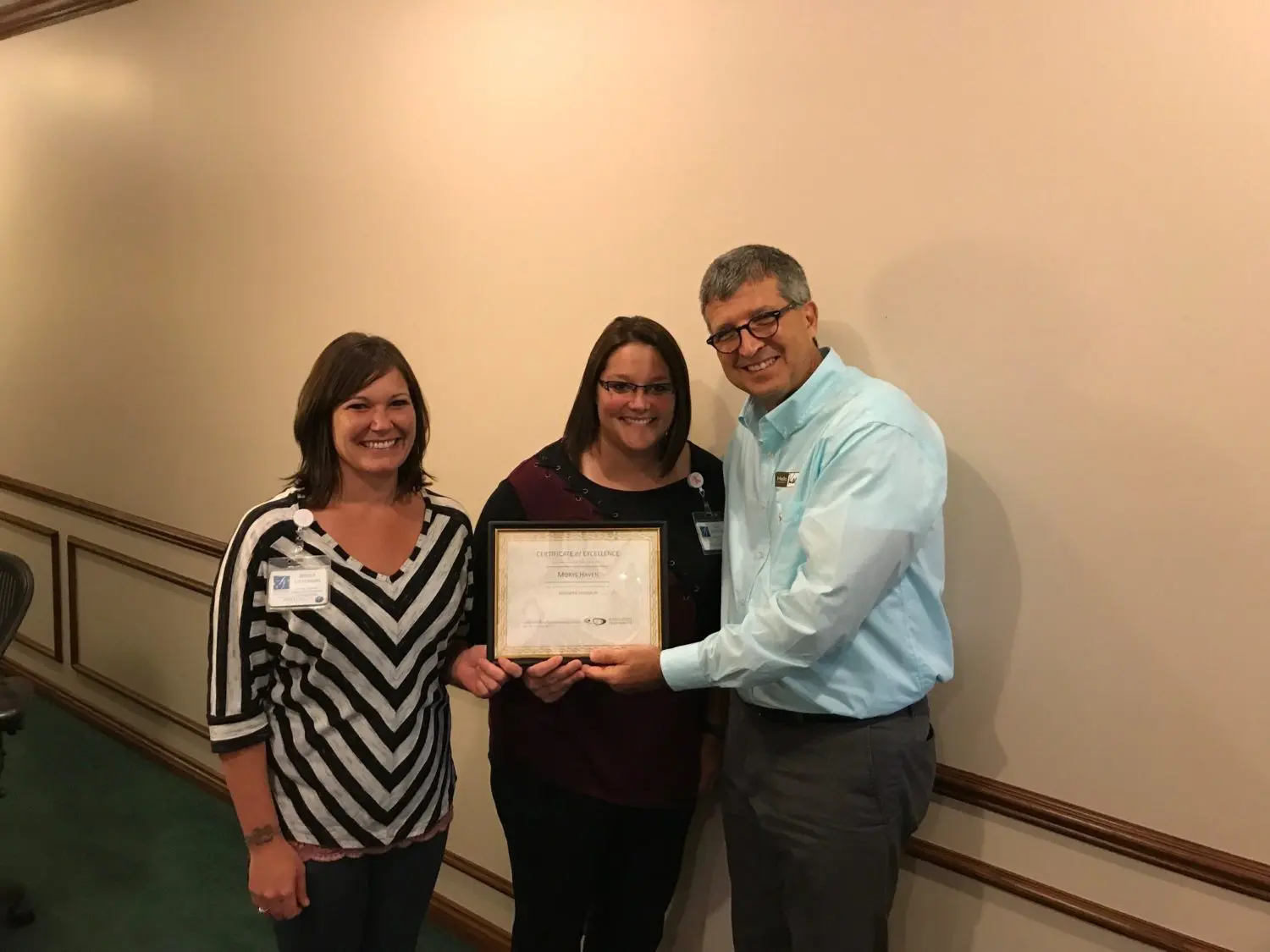Dr. Randy Beckett, PMHNP-BC (right) of Encounter Telehealth works directly with Jessica Lieberman (left), Social Services Director and Admission Coordinator and Tara Watchorn (Center), BSN, RN, Director of Nursing of Morys Haven Care Center to coordinate the reduction of antipsychotic use.
Human Rights Watch recently reported that off-label antipsychotic drug use (drugs used for a purpose other than the FDA-approved use) is at dangerously high levels in many U.S. nursing homes, particularly in residents with dementia. Each week 179,000 people who live in nursing homes are given antipsychotic drugs for which they do not have a proper diagnosis, according to the report.
Board-certified psychiatrists and psychiatric nurse practitioners can work with the staff and primary care providers at skilled nursing facilities to reduce antipsychotic use through staff education and evaluation of each resident’s mental health needs. Dr. Randy Beckett, one of Encounter’s psychiatric nurse practitioners, said Encounter Telehealth has succeeded in helping many facilities reduce their use of antipsychotics by at least half. With Encounter’s psychiatric nurse practitioners’ help some facilities have lowered their antipsychotic use to less than 10% or even 0%. These facilities are well below the national average.
What Are Antipsychotics?
Antipsychotics are powerful drugs designed to control psychosis, which is a break with reality characterized by delusions or hallucinations. They were created to treat schizophrenia and may also be used to treat psychiatric symptoms associated with Huntington’s disease or Tourette’s Syndrome.
For dementia, Beckett said, antipsychotics should be considered a last resort and used only when a resident is “dangerously agitated or physically aggressive” and when non-drug interventions or other medications have not been effective. When the resident recovers, he or she should be taken off the antipsychotic.
Avoiding antipsychotics is crucial as the drugs have sedative effects, increase the risk of falls, and can reduce the food and fluid intake of residents. Antipsychotics are known to significantly increase the risk of heart failure, sudden cardiac death, and infections that lead to death.
Why Are Antipsychotics Prescribed Off-Label?
Antipsychotics are prescribed off-label because their sedative effects can control behaviors in residents with dementia.
“There are some nursing facilities which do not have proper psychiatric care to help them with residents who are agitated and have mental health problems.” Beckett said. “However, when a nursing facility partners with Encounter Telehealth, they have made the decision to commit time and resources to proper psychiatric care for their residents. These nursing facilities make progress and decrease the inappropriate use of medications with the care of our psychiatric nurse practitioners and the dedication of their staff.”
“Sometimes staff are worried to ‘take away’ the antipsychotics, fearing the residents will be aggressive and dangerous,” Beckett added. “However, with staff training, these fears can be addressed and the nursing facility can reduce their use of antipsychotics.”
How Encounter Telehealth Works to Reduce Antipsychotic Use
Encounter’s psychiatric nurse practitioners work with the facility and may consult with the primary care provider or specialist who prescribed the medication in order to reduce antipsychotic use.
When determining whether to start, stop, increase or decrease medication, the patient’s symptoms and diagnosis, as well as the medication’s risks and effectiveness, must be taken into account,” Beckett said.
“During our visits with residents we talk with the staff to determine how the resident is feeling with an eye always towards reducing medications or stopping them entirely if the resident is doing well,” Beckett said. “We work to always be in compliance with CMS regulations about medication reductions. This requires for us to be looking for medications which are no longer of benefit to the patient or which, due to a change in the resident’s general or mental health, may be reduced or stopped entirely. An antipsychotic is the last medication the nursing home staff wants to use.”
Encounter’s psychiatric nurse practitioners are always on the lookout for general medical medications which may be increasing psychiatric symptoms or causing drug interactions. These psychiatric nurse practitioners are in a unique position to alert primary care providers when they have noticed adverse psychiatric reactions which may be due to general medical medications.
“Encounter Telehealth also provides an informed consent form to educate residents, families and caregivers on the risks of taking psychiatric medications. It is not just antipsychotics which can cause minor or severe side effects. Any medication be a risk to a resident. Our practitioners discuss risks with residents, family members and caregivers.” Beckett added.
Addressing Root Causes
The Human Rights Watch report mentioned nursing home staff shortages as a possible cause for off-label prescription of antipsychotics. Beckett described new strategies to reduce staff stress and increase the comfort and quality of life for nursing home residents. For instance, residents may be allowed to sleep through the night, rather than being woken to use the restroom or change clothes; or they may choose when to get up and eat breakfast, instead of doing it on schedule.
“These two changes alone reduce the workload of staff and usually result in calmer and happier residents,” Beckett said. Staff may even get to build their own schedules, increasing their control over their work lives.
What is the Key to Reducing Antipsychotic Use?
“The key to reducing antipsychotic use is leadership at the facility,” Beckett said. He added, “When the administration and nursing leadership educate the staff and champion reducing antipsychotic use, there is success.”
Katherine Hartner is Encounter Telehealth’s Social Media and Marketing Intern. She is studying journalism, with a concentration in PR and advertising, at UNO. She has written multiple articles for the Gateway, UNO’s student-run newspaper, and is active with MavRadio, UNO’s college radio station. In her free time, she enjoys writing fiction, gardening, and volunteering.


